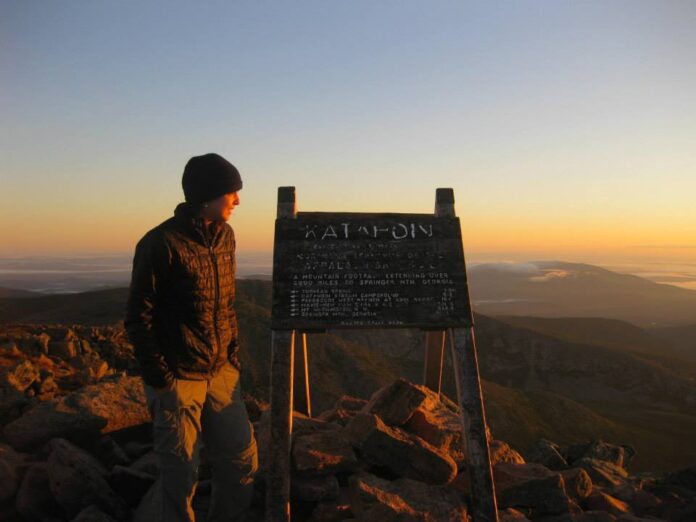After returning home from my 2,200-mile trek on the Appalachian Trail, I couldn’t sleep in my bed. My body had adapted to the rigidity of life on the ground, and I no longer felt comfort from the soft spaces of life. Instead, I’d grown accustomed to the grisly hardness that backpacking required of its people. My body had become granite-like from daily life in the mountains.
Like the mountains over which I passed, I’d become hardened by the elements. For four months, I’d hiked nearly 20 miles every day, burning 6,000 calories over the span of 24 hours. My quads bulged beneath my shorts, propelling me forward. My mouth couldn’t keep up with the energy expenditure, and I was emaciated. Yet my mind became focused and calculated in its operation.

I became incessantly aware of the patterns in the sky, the shifting breezes and the distance to the next water source. My heart became open to chance encounters with strangers. And just as soon as I was becoming confident in my ability to navigate the wilderness, I’d reached the end of the trail.
Home Sweet Detroit
After a horrible 32-hour bus ride, I was back in Detroit, embracing my Mom, and feeling grateful to have a roof over my head. I no longer had to worry about getting caught in a hail storm or losing my shelter to the wind. I was home, where food was plentiful, and life seemed to be greeting me with new possibilities. It was time to adapt to the life I’d known before hiking the Appalachian Trail.
I needed to be still, and to recover after my journey even though all I wanted to do was to keep moving. Afterall, an object in motion stays in motion. And movement had been my medicine for nearly half of the year. I’d found strength in my own abilities, growing confident that I could accomplish what I’d set out to do. The abrupt jolt back into my normal life caused a disquieted mind and a fidgety body. It was hard to stay still.
My discomfort wasn’t just isolated to my physical body. I felt a sense of clarity for the first time in my life, and the clarity pushed me into an emotional desperation. I’d learned that, despite what society tells us, it is possible to live in tune with your body, mind, and spirit.
You don’t have to wrap yourself around a meaningless occupation in order to heighten someone else’s production standards. Instead, you could choose to embrace your abilities and leap into the unknown. Sure, it takes a certain amount of gusto to be willing to leave the comfort of familiarity. But just outside of your comfort zone is a possibility. I knew all of this, and still, I wasn’t sure how to apply it to my new life.
Reckoning With Myself
How does one discard the things that shackle them, only to return back to a shackled existence? When money becomes meaningless, but life requires it, what do you do? I was surrounded by the four lime-green walls of the bedroom that had nursed me through my early life. Yet I felt like I was suffocating. While I revelled in the ability to be indoors during a particularly treacherous thunderstorm, most of the time, it felt unnatural to be inside again. I was once again disconnected from the planet, scrolling endlessly on social media pages to pass the hours. And the dissonance tortured me.
Post Trail Depression
What I didn’t realize is that most hikers go through a period of what we call: “post-trail depression”. There’s even a term for it! After you’ve completely destroyed your life and motivated yourself to move forward through thousands of miles of trail, returning home seems to be the low to the high. An article that was written by Anne K. Baker alluded to this phenomena, detailing the reasons why we may struggle to transition back into “normal life.”
Baker pointed to a number of factors that might shed some light on this idea. In the wilderness, we experience extreme simplicity, purpose, adventure, exercise, and often community. Her argument, as a licensed clinician, is that it’s actually a period of grief instead of a period of depression. Hikers lose the things that they fought so hard to gain, and this loss becomes particularly evident once we leave the trail for the last time.
Baker also found that gender, age, and mental health history aren’t predictors for outcomes that relate to this grief. The job that you’re returning to may also impact your levels of grief. If you hate it, for example, your transition may become more difficult.
Upon my return, I was clueless about the trajectory of my life. I began applying to jobs in the plastics industry. It was where I’d had my background, afterall. I knew how to speak the language and conduct the negotiations.
One day, I got an interview for an automotive company that was looking to make an addition to their purchasing team. I put on my nicest business casual suit, and then I looked out the window. The gentle pitter patter of the rain forced me to reckon with myself. I could either wear a pea coat to provide my potential bosses with the illusion that I fit in, or I could slip my Arcteryx rain jacket over my clothes, knowing that the Gore Tex fabric provided a more practical alternative.
I went to the interview allowing that thin Goretex jacket to cover me like a new layer skin. Even as I was pulling into the parking lot, I knew I wouldn’t accept the job even if I got it because I’d changed, and there was no way to return to the person I’d been before I left for the Appalachian Trail. The girl who pretended to fit in was gone.
For More Inspiration:
















It took me nine months to recover and I had a good plan involving heavy exercise, weight training and running. Endorphin withdrawal is real and it’s almost impossible to generate the amount to which hikers become accustomed on the trail.
Comments are closed.